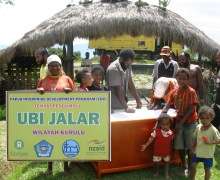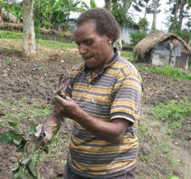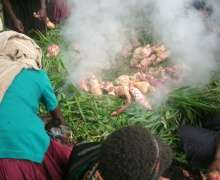Our partner in Papua is at the forefront of a revival that’s improving food security and incomes.

Oxfam and its partner, YAPUM, are at the forefront of a revival in growing the traditional sweet potato (ubi), helping communities improve their food security and incomes.
Papuans have been growing ubi for hundreds of years in the highland mountains that arc through central Papua. With the arrival of migrants from other parts of Indonesia, however, the consumption of rice has been favoured. White rice has been subsidised by the government and promoted as a civilised food and consequently, fewer Papuans are growing ubi.
The rice subsidy has recently been reduced and now rice costs four to five times more in Papua than in other parts of Indonesia. It also requires a cash income, which many people in rural communities simply don’t have.
Perius Murip is the head of the Mutiara Farmer Group in Jayawijaya. He tells us “Rice was introduced to local people in Jayawijaya and people became dependent on it. But when the aeroplane doesn’t bring rice to Jayawijaya, hunger appears.”
Growing better, growing incomes
 |
| A community sweet potato collection point in Jayawijaya. |
Oxfam’s partner YAPUM, recognised the potential to improve incomes and food security for indigenous communities, the poorest communities in Indonesia, by encouraging them to return to using their land to grow the traditional ubi.
The project is providing training, seeds and technical support to farmers; improving processing and preservation techniques; improving access to local and regional markets; and increasing government and private sector support for Papuan business enterprises.
We’re also encouraging farmers to add value to their crops so they can build new income streams. By using basic technology to make ubi flour, families can now make cakes, cookies, bread and noodles to sell at the market.
When the pilot project was launched in 2009, 55 farming families took part. Today more than 11,000 farmers and hundreds of hectares of land are dedicated to growing ubi.
 |
| By growing ubi and other veges, Sarlota Itlay can now meet her family’s needs |
Sarlota’s story
Sarlota Itlaylives in Musaima Village in Hubikiak with her four children. Her husband passed away in 2001, and she was struggling. In 2009 she was one of the first farmers to get involved with the Ubi project.
“We opened up 10 hectares of land to grow Ubi with another 55 households. We earned quite a lot of money from the group harvest in that first year,” says Sarlota.
Since becoming part of the project she now farms cabbages, bean leaves, cucumber and spinach as well as a large crop of Ubi. She sells her surplus produce locally so she can put profit back into the farm.
“After doing this project with Oxfam and YAPUM, I have confidence that the ubi crop will give more income and can fulfil my family’s monthly costs.”
Coordination: the key to success
The coordination with other local partners including farmers, small business and local government is vital to its long-term success and sustainability of the project.
Ir. Paul Sarira, Head of Estates and Food for Jayawijaya District Government, tells us “For years I have had difficulty implementing government programmes into the community. Now this approach by YAPUM and Oxfam with sweet potato provides a model and partnership which the government can use to increase the incomes and benefit the people.
Women’s leadership
 |
| Cooking the traditional ubi to celebrate a successful harvest. |
Encouraging women’s participation and leadership is another important aspect of the project and is bringing some great results.
Sarlota was one of the women appointed to lead a small farmer group. “I learned a lot about farm management and leadership and I gained the confidence to lead the group and to speak in front of other people,” says Sarlota. She has now been promoted to working with the local Hubikiak Sub-district Government as village secretary.
Sarlota tells us “I always pray that through the assistance of Oxfam and Yapum, we can improve the economic circumstances for our ubi farmers and their families, and especially for indigenous people in the mountainous areas of central Papua.”



